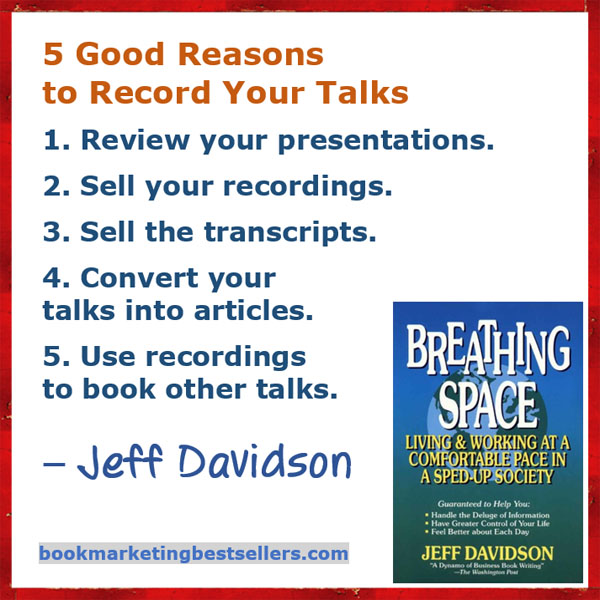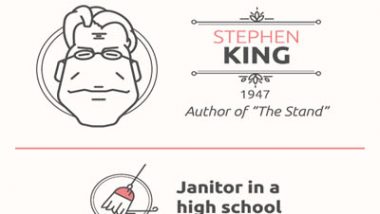Guest post by Jeff Davidson
Every time you speak to a group, regardless of who did the booking, you have the opportunity to create an audio CD (and/or perhaps a DVD) simply by bringing your own equipment. There are five good reasons why it’s worth recording yourself as often as possible:
1. Recording affords personal review of your presentation. There is no better way to review your talk than to hear exactly what you said and how you said it.
2. Each recording is potentially salable, as a podcast, an audio or video download, or a CD. CD producers, manufacturers, and distributors can professionally edit your recording, supplying voice overs and transition passages that can result in a salable CD. Keep in mind that there are other audiences similar to the one to whom you spoke. It might pay for you to be able to repeat your presentation on CD.
Audio in the making: when using pocket audio recorders, both you and the organization can benefit as well, when you produce a product that can be used again and again.
3. The transcript is salable. Don’t overlook the value of marketing the transcript to members of the group you addressed. Professional societies frequently offer transcripts from symposia and seminars that they have sponsored to those members who were not able to attend or who wish to have a written record of what was said in the speech.
4. The transcript can be converted into articles. Frequently, a transcript of as few as three or four pages lends itself to being turned into an excellent article. Nearly every author finds it easier to start from an established base and make editorial changes than to face four blank pages and begin writing.
With longer transcripts, it might be possible to extract several excellent articles that include more material than written in your book, which nevertheless can be used to further promote your book and earn additional income.
5. Use recordings to book other talks. After your speech has been recorded, you can extract 5- to 10-minute passages that can be used to develop sample audio snippets for distribution to other meeting planners. What better way for them to assess your oratory skills than to hear a passage from a live performance?
The point here is that each book talk must be assessed for its potential as an audio or video product. And, when you are creating such products, you have further opportunities to collect on-site testimonials. Many times after a lecture, people will come up to you with praise. If it is captured on audio, and particularly video, you have valuable footage, indeed.
Kudos and More
Each time I speak, I seek at least one laudatory letter — be it from the meeting planner, room monitor, key attendees, key officers, or key staff — that I can use in my author’s portfolio. Thus far, I have 975 letters.
If you’re at a private company, schmoozing with the attendees during break or at lunch often leads to other engagements. Perhaps someone in attendance leads his or her own division, branch, office, or team.
If you’re at a convention or conference, you can meet other presenters with more diverse topics and compare notes as to what they’ve learned and what opportunities are available.
To Sum Up
With every presentation you give, a world of opportunities awaits. Your time onsite is precious and, by planning your strategy in advance, you can leverage your speaking opportunities in wondrous ways.
Jeff Davidson Bio
Jeff Davidson is the author of Breathing Space, Simpler Living,and The 60-Second Organizer. Jeff’s books have been published in 19 languages including Arabic, Chinese, Japanese, Malay, Turkish, and Russian; have been featured in 68 of the top 75 American newspapers; and promoted in Time Magazine and the Wall Street Journal.
About John Kremer
John Kremer is author of 1001 Ways to Market Your Books, the Relationships Matter Marketing program, and many other books and reports on book marketing, Internet marketing, social media, and book publicity. -- John Kremer on Book Marketing.


